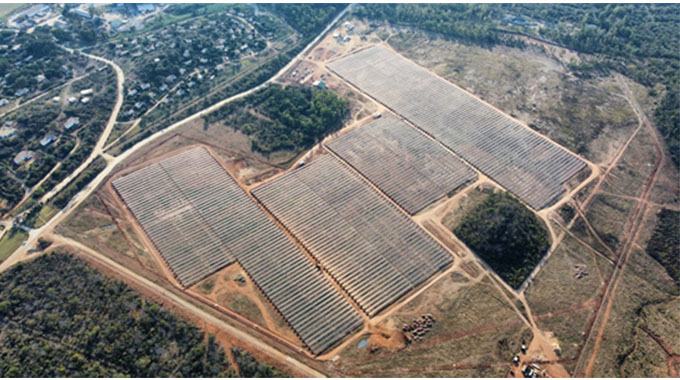CFI holdings to invest in solar farms
AGRI-industrial firm, CFI Holdings Limited plans to invest in solar farms to sustain its manufacturing activities, as it targets 44 percent of shops to be using the power source by year-end.
Several corporate entities are now investing in renewable energy such as solar while broader initiatives such as investing in new smaller hydro-power plants, wind and establishment of bio-digesters in rural areas are being worked on.
For instance, companies such as the diversified crocodile breeder, Padenga, Ariston and Tanganda, have made efforts towards establishing alternative sources of energy like solar to power their operations.
Mining firms have also taken the initiative to reduce over-reliance on energy from the national grid. Victoria Falls Stock Exchange (VFEX) listed resources group Caledonia Mining Corporation Plc, constructed a 12,2MW solar plant at its Gwanda-based gold producer Blanket Mine.
Blanket Mine 12.2MW solar plant (aerial view)
According to NDS1, energy is a key enabler of the acceleration of the country’s modernisation and industrialisation agenda, as well as sustainable socio-economic growth.
In a statement accompanying the group’s 2023 annual report, CFI chairperson, Itai Valerie Pasi, said the group uses different energy sources and Zesa is its main source of power for most operations.
The group also used diesel-powered generators as an alternative to Zesa in cases of load-shedding.
She said the group has been focused on cleaner sources of alternative power, such as solar.
“The Group has rolled out a programme to install solar systems for shops and offices, with 44 percent of shops already using the power source by year-end. In the medium to long-term, the Group plans to invest in solar farms to sustain its manufacturing activities,” she noted.
Ms Pasi also indicated that Agrifoods uses coal to operate its boilers and kitchens, adding that management is tasked with investing in more efficient sources.
Going forward, the group is exploring the adoption of solar energy in all the retail branches, use of energy-saving bulbs for lighting where practical and use of natural lighting instead of artificial lighting in certain areas of our operations, where this is practicable.
In the period under review, the listed firm invested $2,29 billion into property, plant and equipment, mostly in company motor vehicles and recapitalised Victoria Foods plant spares, as well as centre-pivot irrigation equipment at Glenara Estates.
However, unrealised exchange losses on its foreign currency-denominated loans and creditors increased to $139,5 billion in 2023, up 1 838 percent from the prior year.
That saw the group widening its loss before tax to $125,23 billion from $3,06 billion in the prior year.
“Expenses increased in real terms, as a consequence of these expenses being pegged by suppliers and service providers in USD, but converted to ZWL at prevailing parallel market exchange rates.
“On the other hand, selling prices were determined in line with official exchange rates, which consistently lagged behind market rates. The Group incurred unrealised exchange losses of $139,5 billion (2022 — $7,2 billion) on its foreign currency denominated loans and creditors. Consequently, the Group posted a loss before tax of $125,23 billion against a loss before tax of $3,06 billion from the prior year.
USD: Image taken from Shutterstock
Ms Pasi noted that the operating environment is forecast to remain challenging and complex in the medium term, aggravated by the now prevailing El Niño-induced 2023/24 phenomenon.
This, she said, is set to reduce agricultural output in the region.
“Given that the agricultural sector is a mainstay to the group’s operations, pro-active management practices will therefore be employed to ensure the group’s survival in these difficult times.”
Farm & City Centre struggled under the weight of a difficult operating environment, characterised by unstable multiple exchange rates, high-interest rates and reduced consumer spending.
As a result, overall sales volumes for the entity’s key volume drivers fell by 15 percent from the prior year. Following the announcement of the 2023/2024 drought caused by the El Niño phenomenon, the company noted that sales of key agricultural volume drivers such as fertilisers and chemicals are forecast to remain depressed.
In the period under review, the Glenera Estate established 550 hectares of white maize and 236 hectares of soya beans during the period.
Table potato prices realised per kg declined by eight, relative to the prior year due to a flood of supply to the potato market and a reduction in consumer buying power.
The Estate’s cattle breeding and pen fattening operations were maintained with reasonable success.
Under the milling operations division, Agrifoods Sales volumes increased by 31 percent from the prior year, on the back of improved raw material availability on the local market from a good 2022/2023 agricultural harvest.
Agrifoods continues to re-assert its presence in the market, and efforts to improve demand for its products are ongoing as the entity claws back its market share.
On the other hand, Victoria Foods (VF) volumes declined by 14 percent, weighed down mainly by intermittent power cuts affecting production.
Additionally, the maize mill was seriously affected by raw materials supply challenges during the period.
Apart from supply challenges, raw materials prices also rose from the prior year’s level ultimately depressing the division’s financial performance. -newsday











